LA MORTE VIENE DALLO SPAZIO
THE GRAVITATIONAL DANCE OF THE DARK MATTER
di Giampiero Fleba
Da qualche tempo nell’universo underground ‘La morte viene dallo spazio’ non è più ‘solo’ un film di fantascienza del 1958 (diretto da Paolo Heusch, fotografia ed effetti speciali di Mario Bava maestro del cinema horror italiano). Almeno da quando ha trasmutato artisticamente nel percorso creativo di un quintetto di Milano per i quali La Morte Viene Dallo Spazio significa anche e soprattutto musica. Una fantastica cosmologia space rock che nasce come realtà parallela da una porzione dei Giöbia per sviluppare un immaginario stellare kraut-metal-prog-psichedelico di avventure auditive dove fenomeni misteriosi extraterrestri diventano storie, racconti, inviti impressivi al viaggio. Alla vigilia del loro secondo album “Trivial Visions” lasciatevi immergere in questo scenario avvincente guidati dalla conversazione via cyberspazio con gli stessi autori: Melissa Crema (theremin, organ, synthesizers, vocals and lyrics), Stefano ‘Bazu’ Basurto (guitars, sitar and vocals), Camilla Chessa (bass), Angelo Avogadri (flute and guitars), Federico Rivoli (drums)…
Nel momento in cui il suono Giöbia assume carattere distintivo, maturate nuova energia creativa per fondare ciò che avete definito ‘space ritual project’ La Morte Viene dallo Spazio. Ci parlate della sua genesi, di come avete sviluppato questa idea?
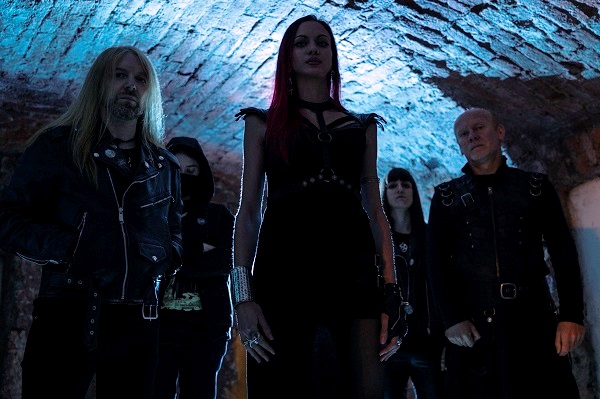 LMVDS La Morte Viene Dallo Spazio è un progetto più “estremo” dei Giöbia, sotto tutti i punti di vista: sia sul versante della musica in sé, attingendo in alcuni brani da sottogeneri del metal come il primo death e black di Atheist, Nocturnus e Pestilence, sia per la natura stessa della band, nata inizialmente senza una particolare progettualità, contraddistinta a lungo dalla volontà di improvvisare liberamente. Nonostante questo, è innegabile che un anello di congiunzione tra i due gruppi ci sia, come nei richiami ad una psichedelia di cui i Giöbia sono fortemente impregnati e che anche ne La Morte Viene Dallo Spazio non vengono a mancare. La band agli albori era un collettivo aperto, una sorta di comune comprendente musicisti che si alternavano sul palco senza prove antecedenti, col fine di creare qualcosa di unico, connotato da atmosfere spaziali, tra il drone e la dark ambient, e con un forte utilizzo di synth a rendere più marziano il tutto e dominato dalla più completa improvvisazione. A seguito dell’uscita del primo album “Sky Over Giza”, nel maggio del 2018, è andato creandosi un interesse crescente nei confronti del progetto, che si è manifestato con molte richieste di date in Italia e all’estero, motivo per cui abbiamo deciso di raggiungere una formazione stabile che desse alla band un’identità più definita.
LMVDS La Morte Viene Dallo Spazio è un progetto più “estremo” dei Giöbia, sotto tutti i punti di vista: sia sul versante della musica in sé, attingendo in alcuni brani da sottogeneri del metal come il primo death e black di Atheist, Nocturnus e Pestilence, sia per la natura stessa della band, nata inizialmente senza una particolare progettualità, contraddistinta a lungo dalla volontà di improvvisare liberamente. Nonostante questo, è innegabile che un anello di congiunzione tra i due gruppi ci sia, come nei richiami ad una psichedelia di cui i Giöbia sono fortemente impregnati e che anche ne La Morte Viene Dallo Spazio non vengono a mancare. La band agli albori era un collettivo aperto, una sorta di comune comprendente musicisti che si alternavano sul palco senza prove antecedenti, col fine di creare qualcosa di unico, connotato da atmosfere spaziali, tra il drone e la dark ambient, e con un forte utilizzo di synth a rendere più marziano il tutto e dominato dalla più completa improvvisazione. A seguito dell’uscita del primo album “Sky Over Giza”, nel maggio del 2018, è andato creandosi un interesse crescente nei confronti del progetto, che si è manifestato con molte richieste di date in Italia e all’estero, motivo per cui abbiamo deciso di raggiungere una formazione stabile che desse alla band un’identità più definita.
Sul vostro sito bandcamp e sul vostro canale Youtube sono disponibili concerti che inducono a pensare come la vostra musica tragga linfa creativa dalla performance live e dall’improvvisazione fin dai primi momenti. Si è plasmato così il vostro suono?

LMVDS Inizialmente, tra il 2015 e il 2017, gli unici membri fissi della formazione erano Bazu (chitarra, sitar) e Angelo (flauto). Il progetto, per sua natura inizialmente molto estemporaneo, prevedeva che ad ogni concerto venissero invitati ad affiancarsi a loro musicisti sempre diversi, appartenenti ad altre band della scena musicale milanese, in una sorta di jam session caratterizzata da atmosfere oscure. I live di quegli anni si sono svolti prevalentemente a livello locale, in Lombardia, dove viviamo. Verso la fine del 2017 è subentrata Melissa ai synth e alla voce; da quel momento il progetto ha acquisito una forma diversa, più strutturata e “internazionale”, abbiamo iniziato infatti a prendere contatti con promoter e agenzie di booking e di lì a poco siamo stati invitati a partecipare al Dunajam festival (giugno 2018). È stato così che Camilla e Federico si sono uniti a noi rispettivamente al basso e batteria.
Il debutto nel 2018 con “Sky Over Giza”, in diverse edizioni viniliche associate a pianeti e colori che possono essere scelti secondo un proprio gusto personale. Davvero originale e già ristampato una volta. Come è nata questa idea e a cosa si ispira?
LMVDS “Sky Over Giza” è stato composto ispirandoci alle colonne sonore dei b-movie sci-fi horror; con i suoi brani abbastanza lunghi e dilatati, atmosfere cupe e al contempo a tratti sognanti, potrebbe ben rappresentare il viaggio verso un pianeta sconosciuto e preparare il terreno per l’incontro con le creature che lo popolano. Da qui nasce l’idea dei vinili di diversi colori, ognuno collegato ad un pianeta immaginario.
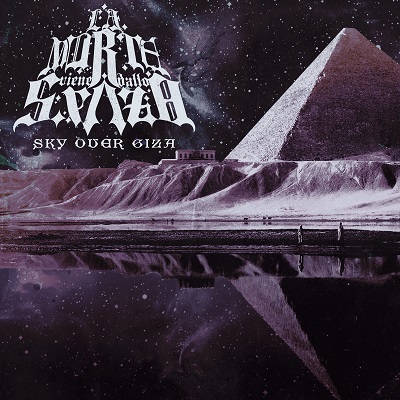 Pur restando nel solco space rock tracciato da Giöbia apre a nuovo orizzonte di suoni in cui spiccano le tastiere. Intensi flussi elettronici che evocano la kosmische musik di Tangerine Dream e Popol Vuh ma anche per la presenza di un flauto, gli esperimenti di Nik Turner post-Hawkwind registrati dentro la piramide di Cheope e utilizzati in album come “Xitintoday” (1978) e “Sphynx” (1993). Vi trovate con questi riflessi musicali?
Pur restando nel solco space rock tracciato da Giöbia apre a nuovo orizzonte di suoni in cui spiccano le tastiere. Intensi flussi elettronici che evocano la kosmische musik di Tangerine Dream e Popol Vuh ma anche per la presenza di un flauto, gli esperimenti di Nik Turner post-Hawkwind registrati dentro la piramide di Cheope e utilizzati in album come “Xitintoday” (1978) e “Sphynx” (1993). Vi trovate con questi riflessi musicali?
LMVDS Nik Turner qualche tempo fa ci ha contattati e ci ha raccontato proprio della sua esperienza nella piramide di Cheope, collegandosi al titolo del nostro primo album “Sky Over Giza” e alla presenza del flauto nella nostra musica. Avevamo iniziato a parlare della possibilità di fare un tour assieme, che poi, purtroppo, sia per difficoltà logistiche che per il lockdown arrivato non molto tempo dopo, non si è mai realizzato. Nik è una persona davvero stupenda e contiamo un giorno di poter realizzare questo progetto rimasto per ora in sospeso.
In linea generale, attingiamo molto dalla psichedelia e ci sentiamo fortemente impregnati in particolare della scena kraut rock tedesca. Gli artisti che hai citato, assieme anche ad Ash Ra Tempel e Amon Düül II, fanno sicuramente parte del nostro background.
Cosa vi ha spinto a partire da questo scenario ‘psicogeografico’? Specialmente la seconda parte dell’album, più cosmica-espansa-fluttuante (lato B del vinile), con ‘Mors Vocat’ e ‘Fever’, sembra manifestare un’esperienza psichedelica 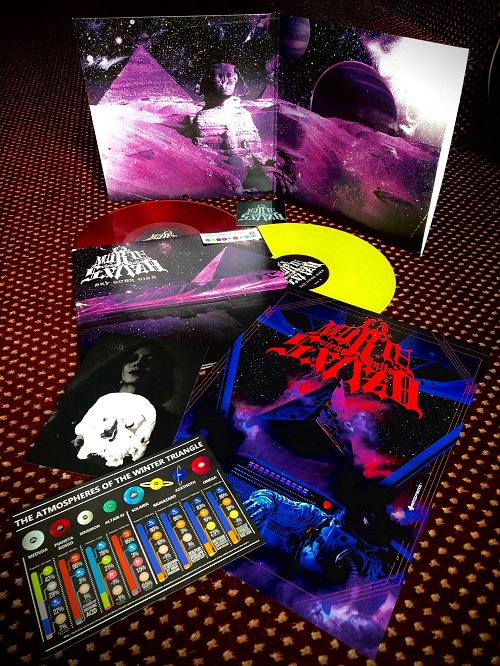 indotta dalla musica…
indotta dalla musica…
LMVDS Il titolo “Sky Over Giza”, con (non troppo) implicito riferimento alla piramide di Cheope, raffigurata in copertina, si ispira ad alcuni studi che riteniamo, se non al cento per cento veritieri e scientificamente accettati all’unanimità, quantomeno molto affascinanti. Parliamo della cosiddetta paleoastronautica, teoria diffusasi tra gli anni ‘60 e ‘70 del secolo scorso, la quale assume che ci sia effettivamente stato un contatto tra le antiche civiltà della Mesopotamia e civiltà altre, extraterrestri.
Il nostro album, con un panorama sonoro ricco di sintetizzatori e drone a conferire un alone di attesa e mistero, come a presagire che qualcosa di non umanamente controllabile stia per accadere, pensiamo che possa ben sposarsi con questa tematica.
Il lato A dell’album sviluppa sonorità più space rock su intense progressioni metal psichedeliche. Qui è davvero fantastico l’impatto strumentale, vocale ed effettistico di tutto il vostro equipaggiamento. L’immediatezza espressiva che emerge dal fondo del cosmo come forza liberatrice, una sfida al già udito?
LMVDS In realtà la nostra musica spesso non risulta essere così immediata, anzi necessita di più ascolti per essere capita, forse perché esce dagli schemi del facilmente classificabile, nell’intento di creare un qualcosa di unico che disintegri i confini tra alcuni generi, comunemente considerati tra loro inconciliabili e privi di punti di unione, plasmandoli l’uno nell’altro. Può essere vista come una sfida al già udito in questo senso, per la componente di novità che può portare l’accostamento del kraut e space rock con il primo death e black metal.
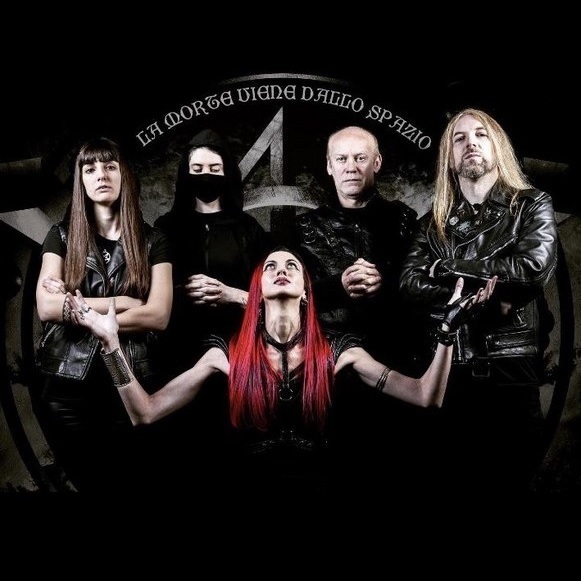 Melissa, che tipo di strumentazione elettronica suoni? Si sente spesso anche l’uso di theremin. Lavori anche con campionamenti, nastri, tastiere particolari?
Melissa, che tipo di strumentazione elettronica suoni? Si sente spesso anche l’uso di theremin. Lavori anche con campionamenti, nastri, tastiere particolari?
LMVDS Suono diversi tipi di tastiere e sintetizzatori, principalmente dei primi anni ‘80, tra cui un Moog Opus 3, molto usato soprattutto in “Sky Over Giza”, un Roland JX-8P e un Formanta Polivoks, synth di fabbricazione sovietica, assieme al Moog Theremini, immancabile compagno di viaggio dall’inizio di questa avventura con La Morte Viene Dallo Spazio. A differenza del theremin classico, questo mette a disposizione un’ampia gamma di suoni che ci ha permesso di dare diverse sfumature ai brani, caratterizzandoli.
Pensavo al bellissimo libro “Le pioniere della musica elettronica” di Johann Merrich, ricercatrice e musicista che svela un universo sperimentale di energia creativa femminile, Italia inclusa tra cui Doris Norton nota nella scena underground milanese degli anni 70 poi con Jacula e Antonius Rex, e mi chiedo se in qualche modo siano state fonte di ispirazione o conoscenze personali…
LMVDS Non abbiamo avuto modo di conoscere Doris Norton personalmente, ma le siamo grati per il contributo che ha dato alla scena musicale italiana. Il progressive a tinte scure degli Jacula è intriso nel nostro dna, nonostante non vi siano marcati riferimenti nei nostri brani, ma qualcosa forse si può leggere tra le righe.
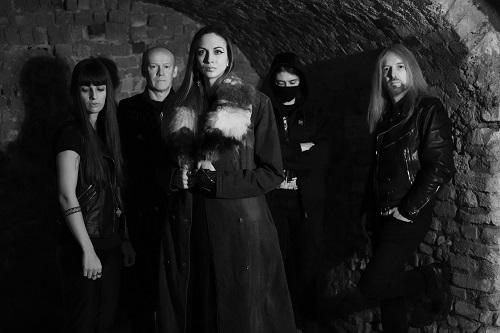 Assieme a Doris vogliamo ricordare la stupenda voce di Silvana Aliotta, che ha militato, tra gli altri, nei torinesi Circus 2000, band con una storia tanto breve quanto significativa per il prog italiano, che nel 1970 ha pubblicato l’album dall’omonimo titolo, forse il primo disco cantato in lingua inglese uscito in Italia.
Assieme a Doris vogliamo ricordare la stupenda voce di Silvana Aliotta, che ha militato, tra gli altri, nei torinesi Circus 2000, band con una storia tanto breve quanto significativa per il prog italiano, che nel 1970 ha pubblicato l’album dall’omonimo titolo, forse il primo disco cantato in lingua inglese uscito in Italia.
In questa dimensione il vostro contributo di musiciste, enunciate come entità femminili del gruppo, può anche essere parte di un simbolico rituale di transizione dal ciclo patriarcale di questa società?
LMVDS Dal nostro punto di vista la musica esula da queste dinamiche. Le grandi musiciste donne ci sono sempre state; potremmo menzionare, tra le tante, Clara Rockmore e la sua brillante carriera da thereminista già negli anni 30-40. A differenza di tanti altri ambiti, come quello professionale e politico, nel nostro settore fortunatamente il sesso femminile gode di pari dignità rispetto a quello maschile. Non ci sentiamo quindi portavoci di un genere, semplicemente facciamo quello che ci piace, suonare, e cerchiamo di farlo al meglio.
La Morte Viene Dallo Spazio ha annunciato il secondo album “Trivial Visions” che uscirà il 26 Marzo pubblicato da Svart Records etichetta indipendente finlandese tra le più attive nel panorama europeo. Un altro meritato 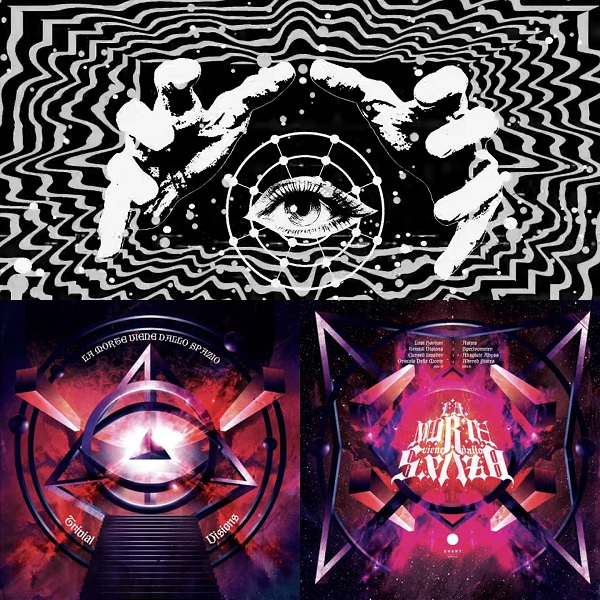 riconoscimento per una band italiana. Una grande soddisfazione immagino. Come è avvenuto il contatto?
riconoscimento per una band italiana. Una grande soddisfazione immagino. Come è avvenuto il contatto?
LMVDS Già in fase di composizione dei nuovi brani avevamo individuato in Svart Records l’etichetta discografica che desideravamo producesse “Trivial Visions”. Abbiamo sempre seguito Svart: apprezziamo molto il fatto che riesca a prescindere da un genere, avendo nel suo roster band di diverse estrazioni, seppur legate da una sorta di filo invisibile, di minimo comune denominatore rintracciabile nella volontà di distinguersi dal comune. È una label che presta attenzione all’originalità dell’artista; questa a nostro avviso è una nota di merito, soprattutto in una realtà, quella dei nostri giorni, in cui pare che l’”ascolto facile”, poco impegnativo perché facilmente classificabile, vada per la maggiore. Era l’estate dell’anno scorso quando abbiamo inviato una semplice mail a Svart con le pre-produzioni del nuovo album, proponendolo per la release. Di lì a poco ci hanno risposto manifestando interesse nella nostra musica e nelle influenze cinematografiche in questa contenute, così abbiamo iniziato a programmare l’uscita e a definirne tutti i dettagli. Ad oggi siamo davvero contenti di questa collaborazione, in questa label abbiamo trovato un partner affidabile con cui lavorare in un’ottica di crescita continua.
Avete già anticipato il vorticoso motorik di ‘Cursed Invader’ e le oscillazioni hard psichedeliche flautate di ‘Ashes’. Su quale idea si è sviluppato “Trivial Visions” e che novità presenta nel suono rispetto a “Sky Over Giza”?
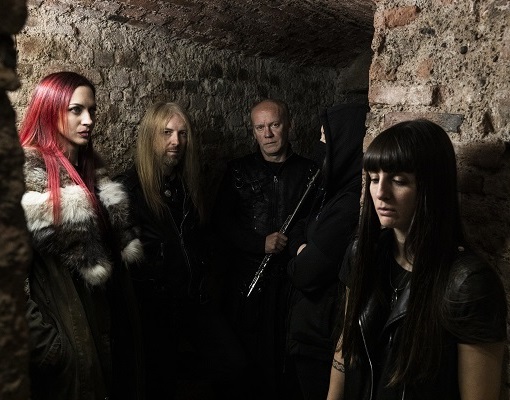 LMVDS Diversamente da “Sky Over Giza”, album davvero molto sperimentale e liberamente improvvisato a partire da una data tonalità e velocità, i brani di “Trivial Visions” sono stati composti, arrangiati e studiati. Sicuramente c’è stata una particolare ricerca del suono che nel precedente album, nato da due giornate di jam session in studio di registrazione, non è presente. Ci siamo lasciati ispirare da atmosfere oscure, volevamo che i nuovi brani avessero un forte impatto sull’ascoltatore e sicuramente abbiamo lasciato trapelare una marcata inclinazione verso il metal, ma senza abbandonare Ia cosmicità iniziale del progetto.
LMVDS Diversamente da “Sky Over Giza”, album davvero molto sperimentale e liberamente improvvisato a partire da una data tonalità e velocità, i brani di “Trivial Visions” sono stati composti, arrangiati e studiati. Sicuramente c’è stata una particolare ricerca del suono che nel precedente album, nato da due giornate di jam session in studio di registrazione, non è presente. Ci siamo lasciati ispirare da atmosfere oscure, volevamo che i nuovi brani avessero un forte impatto sull’ascoltatore e sicuramente abbiamo lasciato trapelare una marcata inclinazione verso il metal, ma senza abbandonare Ia cosmicità iniziale del progetto.
Come siete riusciti a superare le difficoltà dei vari lockdown per registrarlo? La forza dell’arte nonostante tutto?
LMVDS L’album è stato registrato prevalentemente nella seconda metà del 2019, periodo in cui l’emergenza pandemica non era ancora esplosa. A quel tempo eravamo entrati in studio di registrazione senza problemi di sorta, in questo possiamo dire quindi di essere stati fortunati. Nei primi mesi del 2020 ci siamo dedicati alla finalizzazione dei brani, approfittando in particolare del lockdown di marzo e aprile per mixare le tracce per conto nostro.
La difficoltà maggiore di questo ultimo anno è stata la totale assenza di concerti, per noi vitali, da tutti i punti di vista, economico sicuramente, ma anche e soprattutto umano. Il lato positivo della situazione è stato avere lo stimolo costante del nuovo album su cui lavorare e, in seguito, su cui programmare la release e annesse attività di promozione. Aver avuto la mente impegnata in tutto questo e un obiettivo su cui concentrarci, ci ha aiuto molto ad andare avanti.
Band photos by Matteo Deiana / Spazio RAW
DISCOGRAPHY
“Jam in Erba” (Bandcamp download) 2017
“Sky Over Giza” (LP & CD, Bloodrock Records, Debemur Morti Productions) 2018
“Trivial Visions” (LP & CD, Svart Records) 2021
YOUTUBE.COM/LAMORTEVIENEDALLOSPAZIO
SPOTIFY.COM/LAMORTEVIENEDALLOSPAZIO

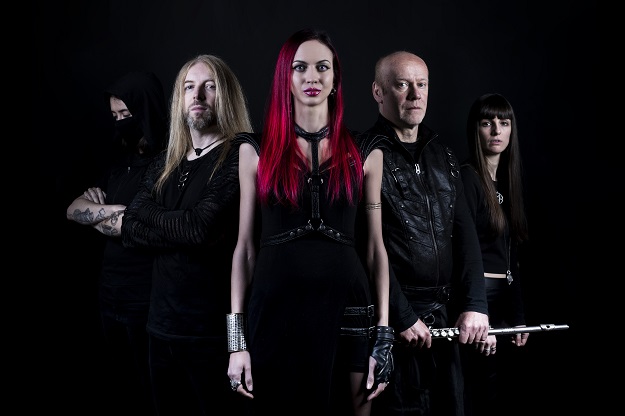
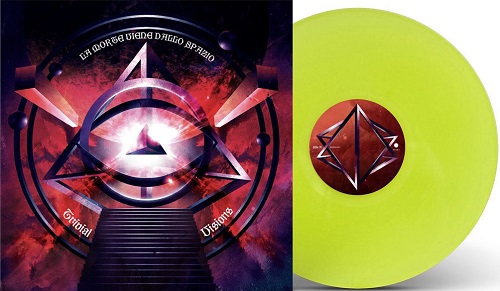
English translation…
LA MORTE VIENE DALLO SPAZIO (Death Comes From Space)
THE GRAVITATIONAL DANCE OF THE DARK MATTER
by Giampiero Fleba
For some time in the underground universe ‘La morte viene dallo spazio’ is no longer ‘just’ a 1958 fiction film (directed by Paolo Heusch, photography and special effects by Mario Bava, master of Italian horror cinema). At least since it artistically transmuted in the creative path of a quintet from Milano for which La Morte Viene Dallo Spazio also and above all means music. A fantastic space rock cosmology that was born as a parallel reality from a portion of Giöbia to develop a stellar kraut-metal-prog-psychedelic imaginary of auditory adventures where mysterious extraterrestrial phenomena become stories, tales, impressive invitations to travel. On the eve of their second album “Trivial Visions” let yourself be immersed in this compelling scenario guided by the conversation via cyberspace with the same authors: Melissa Crema (theremin, organ, synthesizers, vocals and lyrics), Stefano ‘Bazu’ Basurto (guitars, sitar and vocals), Camilla Chessa (bass), Angelo Avogadri (flute and guitars), Federico Rivoli (drums) …
When the Giöbia sound takes on a distinctive character, you also mature new creative energy to found what you have defined as a ‘space ritual project’ Death Comes from Space. Can you tell us about its genesis, its formation, how did you develop this idea?
LMVDS La Morte Viene Dallo Spazio is a more “extreme” project by Giöbia, from all points of view: both on the side of the music itself, drawing on some songs from metal subgenres such as the first death and black by Atheist, Nocturnus and Pestilence , both for the very nature of the band, initially born without a particular planning, characterized for a long time by the desire to improvise freely. Despite this, it is undeniable that there is a link between the two groups, as in the references to a psychedelia of which the Giöbia are strongly impregnated and which also in La Morte Viene Dallo Spazio are not missing. The band at the beginning was an open collective, a sort of art commune including musicians who alternated on stage without prior rehearsals, with the aim of creating something unique, characterized by spatial atmospheres, between the drone and the dark ambient, and with a strong use of synths to make everything more alien and dominated by the most complete improvisation. Following the release of the first album “Sky Over Giza”, in May 2018, there was a growing interest in the project, which manifested itself with many requests for dates in Italy and abroad, which is why we have decided to reach a stable line-up that would give the band a more defined identity.
On your Bandcamp site and on your Youtube channel, there are some concerts that make think how your music draws creative lymph from live performance and improvisation from the very first moments. Is this how your sound was shaped?
LMVDS Initially, between 2015 and 2017, the only permanent members of the formation were Bazu (guitar, sitar) and Angelo (flute). The project, initially very extemporaneous by nature, provided that at each concert they were invited to join their ever-changing musicians, belonging to other bands of the Milanese music scene, in a sort of jam session characterized by dark atmospheres. The lives of those years took place mainly locally, in Lombardy, where we live. Towards the end of 2017 Melissa took over from synths and vocals; since that moment the project has acquired a different, more structured and “international” form, we have in fact started to make contact with promoters and booking agencies and shortly thereafter we have been invited to participate in the Dunajam festival (June 2018). This is how Camilla and Federico joined us on bass and drums respectively.
The debut in 2018 with “Sky Over Giza”, in different vinyl editions associated with planets and colors that can be chosen according to one’s personal taste. How did this idea come about and what is it inspired by?
LMVDS “Sky Over Giza” was composed inspired by the soundtracks of horror sci-fi b-movies; with its fairly long and dilated songs, dark and at the same time dreamy atmospheres, it could well represent the journey to an unknown planet and prepare the ground for an encounter with the creatures that populate it. Hence the idea of vinyls of different colors, each connected to an imaginary planet.
While remaining in the space rock groove traced by Giöbia, it opens up a new horizon of sounds in which keyboards stand out. Intense electronic flows that evoke the kosmische musik of Tangerine Dream and Popol Vuh but also for the presence of a flute, the experiments of Nik Turner post-Hawkwind recorded inside the pyramid of Cheops and used in albums such as “Xitintoday” (1978) and “Sphynx” (1993). Do you find yourself with these musical reflections?
LMVDS Nik Turner contacted us some time ago and told us about his experience in the pyramid of Cheops, connecting to the title of our first album “Sky Over Giza” and the presence of the flute in our music. We started talking about the possibility of doing a tour together, which then, unfortunately, both for logistical difficulties and for the lockdown that arrived not long after, it never came true. Nik is a really wonderful person and we hope one day to be able to carry out this project which is still pending.
Generally speaking, we draw a lot from psychedelia and feel strongly imbued with the German kraut rock scene in particular. The artists you mentioned, along with Ash Ra Tempel and Amon Düül II, are certainly part of our background.
What prompted you to start from this ‘psychogeographic’ scenario? Especially the second part of the album, more cosmic-expanded-floating (side B of vinyl), with ‘Mors Vocat’ and ‘Fever’, seems to manifest a psychedelic experience induced by music …
LMVDS The title “Sky Over Giza”, with (not too much) implicit reference to the pyramid of Cheops, depicted on the cover, is inspired by some studies that we believe, if not one hundred percent truthful and scientifically accepted unanimously, at least very fascinating. We are talking about the so-called paleoastronautics, a theory that spread between the 60s and 70s of the last century, which assumes that there has actually been a contact between the ancient civilizations of Mesopotamia and extraterrestrial civilizations.
Our album, with a soundscape full of synthesizers and drones to give an aura of expectation and mystery, as if to predict that something not humanly controllable is about to happen, we think it could well marry with this theme.
The A side of the album develops more space rock sounds on intense psychedelic metal progressions. The instrumental, vocal and effect impact of all your gear is truly fantastic here. The expressive immediacy that emerges from the depths of the cosmos as a liberating force, a challenge to the ‘already heard’?
LMVDS In reality, our music often does not appear to be so immediate, on the contrary it needs more listening to be understood, perhaps because it comes out of the easily classifiable schemes, with the aim of creating something unique that disintegrates the boundaries between certain genres, commonly considered between they are irreconcilable and devoid of points of union, molding them into each other. It can be seen as a challenge to the ‘already heard’ in this sense, due to the novelty component that can bring the combination of kraut and space rock with the first death and black metal.
Melissa, what kind of electronic equipment do you play? The use of theremin is also often heard. Do you also work with samples, tapes, particular keyboards?
LMVDS I play different types of keyboards and synthesizers, mainly from the early 80s, including a Moog Opus 3, widely used especially in “Sky Over Giza”, a Roland JX-8P and a Formanta Polivoks, Soviet-made synth, together with the Moog Theremini, inevitable travel companion from the beginning of this adventure with La Morte Viene Dallo Spazio. Unlike the classic theremin, this one offers a wide range of sounds that allowed us to give different nuances to the songs, characterizing them.
I was thinking of the beautiful book “The pioneers of electronic music” by Johann Merrich, researcher and musician who reveals an experimental universe of female creative energy, including Italy including Doris Norton known in the Milanese underground scene of the 70s then with Jacula and Antonius Rex , and I wonder if in some way they were a source of inspiration or personal acquaintances …
LMVDS We didn’t get to know Doris Norton personally, but we are grateful for her contribution to the Italian music scene. Jacula’s dark-hued progressive is steeped in our DNA, although there are no marked references in our songs, but perhaps something can be read between the lines.
Together with Doris we want to remember the wonderful voice of Silvana Aliotta, who played, among others, in the Turin Circus 2000, a band with a history as short as it is significant for the Italian prog, who in 1970 released the album with the same title. , perhaps the first album released in Italy sung in English.
In this dimension, your contribution as musicians, enunciated as female entities of the group, can also be part of a symbolic ritual of transition from the patriarchal cycle of this society?
LMVDS From our point of view, music goes beyond these dynamics. Great female musicians have always been there; we could mention, among many, Clara Rockmore and her brilliant career as a thereminist already in the 30-40s. Unlike many other areas, such as professional and political, fortunately in our sector the female sex enjoys equal dignity with respect to the male. So we don’t feel like we are carriers of a genre, we simply do what we like, play, and try to do it at our best.
La Morte Viene Dallo Spazio has announced the release of the second album “Trivial Visions” for the end of March which will be released by Svart Records independent Finnish label among the most active in the European panorama. Another well-deserved recognition for an Italian band. A great satisfaction I guess. How did the contact take place?
LMVDS We had already identified in Svart Records the record label we wanted to produce “Trivial Visions” when composing the new songs. We have always followed Svart: we really appreciate the fact that he manages to regardless of a genre, having in his roster bands of different extractions, albeit linked by a sort of invisible thread, with the lowest common denominator traceable in the desire to stand out from the common. It is a label that pays attention to the artist’s originality; in our opinion this is a note of merit, especially in a reality, that of our days, in which it seems that “easy listening”, undemanding because it is easy to classify, is the most popular. It was the summer of last year when we sent a simple email to Svart with the pre-productions of the new album, proposing it for the release. Shortly thereafter they responded by expressing interest in our music and in the cinematographic influences it contains, so we started planning the release and defining all the details. To date we are really happy with this collaboration, in this label we have found a reliable partner to work with in a perspective of continuous growth.
You have already anticipated the whirling Motorik with remarkable video of ‘Cursed Invader’ and the hard psychedelic flute oscillations of ‘Ashes’. What idea did “Trivial Visions” come up with and what is new in the sound compared to “Sky Over Giza”?
LMVDS Unlike “Sky Over Giza”, a very experimental and freely improvised album starting from a given key and speed, the tracks of “Trivial Visions” have been composed, arranged and studied. Surely there was a particular search for sound that in the previous album, born from two days of jam sessions in the recording studio, is not present. We let ourselves be inspired by dark atmospheres, we wanted the new songs to have a strong impact on the listener and we certainly let a marked inclination towards metal leak out, but without abandoning the initial cosmicity of the project.
How did you manage to overcome the difficulties of the various lockdowns to record it? The strength of art despite everything?
LMVDS The album was recorded mainly in the second half of 2019, a period in which the pandemic emergency had not yet exploded. At that time we entered the recording studio without any problems, so we can say that we were lucky. In the early months of 2020 we dedicated ourselves to finalizing the songs, taking advantage in particular of the lockdown in March and April to mix the tracks on our own.
The greatest difficulty of this last year was the total absence of concerts, vital for us, from all points of view, certainly economic, but also and above all human. The positive side of the situation was having the constant stimulus of the new album to work on and, later, on which to plan the release and related promotional activities. Having a mind committed to all of this and a goal to focus on has helped us a lot to move forward.